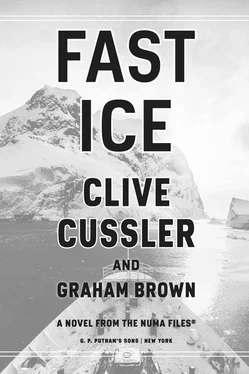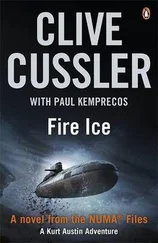“But not everyone is aboard yet,” the copilot replied.
“Start them anyway,” Jurgenson ordered. “Hurry.”
As the copilot went to work, Jurgenson paused at the front of the plane, glancing back along the shore. The scientists were lugging their equipment and water samples toward the craft, waddling through the snow as they approached the plane. Schmidt was foolishly hammering in one last marker. “Come on,” Jurgenson ordered. “Move.”
The aft propeller screeched into motion, with the engine belching black smoke. The pistons fired and the propeller spun up quickly, becoming an instant blur. Down below it, the scientists clambered aboard. Lieutenant Schmidt was still coming.
The captain dropped into the cockpit and slammed the hatch above him. “Number two up and running,” he said. “Start number one.”
As the forward engine fired up, Jurgenson took over. He adjusted the propellers and prepared to move.
“Head count,” he demanded over the intercom.
“All on board,” a breathless Lieutenant Schmidt called out.
“Release the line. And shove us off. We need space to turn.”
In the aft section of the aircraft, Schmidt cut the line and used the plank to push the Dornier back from the ice. It moved sluggishly, drifting a few feet out, but that was all the space Jurgenson needed.
He eased the throttles forward while stepping hard on the rudder. The effort coaxed the plane into a tight turn, the tail swinging around until the nose was pointed back down the length of the lake.
With the aircraft lined up, he set the props for takeoff and pushed the throttles to full. The engines mounted above the fuselage roared and the Dornier began to pick up speed as the power streamed through the airframe.
At first, The Whale moved like its namesake, plowing forward with brute force, shoving the water aside and picking up speed slowly. But as the airflow over the wing increased, the plane rode higher on its keel, reducing the drag substantially. Now The Whale began to fly across the water, picking up speed briskly.
Up ahead, the ice continued to grow, a crystalline pattern merging from both sides.
“How could a lake freeze so quickly?” the copilot asked.
“We must have stirred up cold water from down below,” Jurgenson suggested. “Full flaps. We need lift.”
The copilot deployed the flaps and the Dornier rose until it was skimming across the water, desperate to fly but not yet free.
“We’re not going to make it,” the copilot warned. He reached for the throttles to pull them back.
Jurgenson blocked the man’s hand and kept the engines at full power. The aircraft charged into the leading edge of the rapidly forming ice. It was slush at this point, but it sprayed up against the metal skin of the aircraft, freezing instantly. The struts on the wing and the aft section of the fuselage and part of the tail were coated in seconds.
Jurgenson felt the controls grow heavy and sluggish. But the high-mounted wing and the propellers above it were still clear and dry. It was now or never.
Jurgenson pulled back on the yoke. The Dornier lifted free of the lake, climbed for a moment, then began to drop. It kissed the surface once, skipping and bouncing higher. This time, it held on and began clawing its way toward the sky.
“De-ice the wings and tail,” Jurgenson called out.
His copilot flipped a pair of switches. “Heat’s on.”
The de-icing system channeled electrical power through heating coils in the wing and tail. The coils would melt the ice, but the process was slow. In the meantime, Jurgenson fought to keep the aircraft flying.
“We’re too heavy,” he said, pressing the intercom button. “Dump all excess weight or we’re going to fall out of the sky.”
Focused on the instruments and keeping the wings level, Jurgenson had no idea of the panic his directive had set off in the aft section of the aircraft. The cargo hatch was shoved open. Spare parts, equipment and cold-weather gear were thrown out. A sled, several pairs of skis and a fifty-pound sack of rice, provisioned to keep them alive if they ended up stranded, went next. Everything that could be thrown out was, except for Lieutenant Schmidt’s weighted markers, which the navigator guarded with zealous intensity.
With the aft compartment cleared, the plane was three hundred pounds lighter. Just enough to keep it airborne.
And then the number one engine sputtered.
“Ice in the fuel line,” the copilot said. “Damn those tanks on the Bremerhaven .”
He opened a valve that let more heat from the engine into the carburetors in hopes of keeping the ice from choking off the fuel supply. It was too little too late.
The engine died and the Dornier began to shake. It was about to stall and crash. Jurgenson had no choice. He put the nose down, picking up enough speed to control the descent. But there was no way to remain airborne.
They glided half a mile and hit the snow with jarring impact, not hard enough to destroy the plane but firm enough to damage it.
The fuselage groaned with the impact. Rivets popped and ricocheted through the interior of the Dornier. Jurgenson felt the aircraft yawing as the nose slid left and the tail swung out to the right. The plane was skidding like a car on wet pavement. He tried to control it by stepping on the rudder pedal, but it had little effect.
They slid across the hard-packed snow and then went up a slope. The speed began to drop as they climbed the hill and the plane stopped suddenly as the left wing dug into a snowbank and spun them around.
Jurgenson reached for the controls, instinctively shutting off the fuel pumps and the electrical system. Looking around, he saw no sign of fire. Inhaling deeply, he smelled no smoke or leaking fuel.
They were stopped and alive. They wouldn’t burn. Beyond that, there was little to celebrate.
After sitting in stunned silence for a moment, Jurgenson stood up. He opened the hatch and popped his head out.
They’d come a thousand feet up the side of a hill before settling into deeper snow. The aircraft was turned at a forty-five-degree angle, as if it had been trying to get its nose around and head back down the hill before getting stuck.
Looking back, he saw all the damage he needed to see. The leading edge of the tail was gashed and bent badly. A rip in the side of the airframe ran from one of the sponsons all the way back to the rudder. There was no need to look further. The Whale wouldn’t be flying again.
Dropping back into the cockpit, Jurgenson slumped into his seat. “This will not help my standing with the men in Berlin,” he said. “Radio the Bremerhaven. Give them our position and tell them we need assistance.”
As the copilot powered up the radio and made the dreaded call, Jurgenson looked through the window. He saw the lake in the distance, but the brilliant turquoise color was gone. The lake had turned a drab, solid color that made it almost indistinguishable from the ice and snow around it.
Never in his life had Jurgenson seen a body of water freeze so quickly. It didn’t seem possible. Not at thirty-eight degrees Fahrenheit. Not with geothermal heat warming it from below.
He wondered if it had something to do with the sediment that the scientist had captured in the jug. Perhaps they’d found something remarkable after all.
He thumbed the intercom button. “Fritz,” he said, addressing the scientist by name. “Did you manage to save the water sample?”
“Nein, Kapitän,” the scientist replied. “We had to throw it out to reduce the weight.”
“A pity,” Jurgenson said. “I would like to have known what was swimming around in that strange blue water.”
Читать дальше












